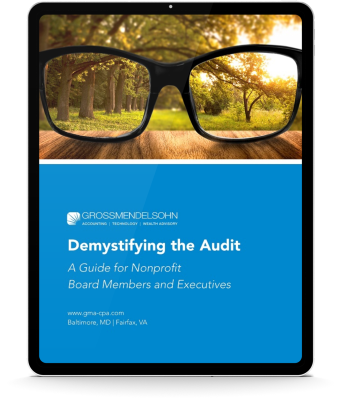Selecting an accounting firm for your nonprofit’s next audit can be a daunting task. Not only might you be unsure of which qualities to look for in a firm, but requesting and reviewing proposals can be a long and tedious process, requiring time and attention that may be needed elsewhere.
However, when an organization relies on templates or outdated requests for proposals (RFPs), they often end up with “proposals” disguised as boilerplate marketing material, which do little to help an organization make an educated decision on which firm to choose.
So, what can help your organization solicit better proposals?
1. Ask About the CPA Firm’s Clients
It’s important that you know how a potential new firm interacts with their clients. The best way to solicit this information is by asking proposing firms to provide references for a few current nonprofit clients, and preferably organizations of a similar size to yours.
However, when it comes to your RFP, don’t ask firms to disclose information on the biggest client(s) they’ve lost in the past X years. While firms are able to solicit permission to share the contact information for existing clients for referral purposes, firms cannot disclose details about past clients.
As a rule, CPA firms – including our firm – guard their clients’ confidentiality tooth and nail. You’ll save yourself and your audit committee time and energy by ditching any questions about specifics on client relationships (past or present), which will only result in answers citing confidentiality. Instead focus on getting in contact with the firm’s provided references so you can make your own conclusions based on your conversations.
2. Focus On What You Care About
If your organization is seeking a firm who specializes in client service, make sure your RFP reflects that. Likewise, if you’re looking to find a new firm to lower your audit fees, make sure fee inquiries are first and foremost. By writing your RFP based on what you are looking for in an audit firm, you’ll save your organization the time and energy needed to wade through information that doesn’t address what you really want to know.
For example, if you are looking to lower your audit fees and aren’t quite as worried about the firm’s experience or level of service, consider asking firms for abbreviated proposals that highlight fees and include a limited amount of background information. This will save you time when reviewing proposals by ensuring the information you are looking for is front and center.
3. Ditch the Boilerplate RFP
If you’re hoping to receive a proposal tailored to your organization, it’s best to ditch the boilerplate RFP your organization might be using. Most RFP templates are similar, if not the same, to the templates other nonprofits in your area are using, which makes it that much easier for proposing firms to simply copy, paste and send the same proposal to many different organizations.
By creating an RFP that asks questions that force firms to think, you are more likely to receive proposals that go beyond the same customary verbiage being sent to a nonprofit down the block.
For example, let’s take one of the most common bullet points in nonprofit RFPs: “Detail your firm’s experience in providing auditing and tax services to companies in the nonprofit sector, as well as organizations of a comparable size to ORGANIZATION NAME.”
How do you think the responses would change if you rewrote that statement to address qualities you’re looking to be demonstrated – competency and experience?
For example, you might change the question to: “Based on the documents attached to this RFP (FY## Financial Statements and Form 990) and your firm’s experience in the nonprofit sector, provide three suggestions you would make to ORGANIZATION NAME as our accounting firm.”
4. Be Specific
If you are looking for certain information, be clear about how you want firms to respond. For example, let’s take a common RFP statement: “Identify the partner, manager, and in-charge accountant who will be assigned to our job if you are successful in your bid, and provide biographies.”
While you want information on the people who will be working with you, is there any information in particular that matters to you? Do you want three pages of biography information or three sentences? Do you really want information on the in-charge accountant or will the partner’s and manager’s information be enough?
For example, when rewriting the statement as the following, how do you think the responses would change?
In 500 words or less, please provide the following information on the partner and manager who will be assigned to our engagement team:
- Brief synopsis of professional experience
- Any related professional designations and how they will directly benefit the work for our organization
- Organizations they serve as a volunteer or board member, including years of service
- Any personal relevance or meaning to our organization’s mission
5. Limit the Number of Firms You Send RFPs to
If you and your audit committee are already strapped for time, consider limiting the number of firms you send your RFP to. While some firms might decline to bid, you should consider that if you send your RFP to ten audit firms, you may receive ten proposals in return. To put this in perspective, depending on how many questions you ask in your proposal, sending RFPs to ten firms could mean you easily end up with over 200 pages of proposal verbiage to review.
One easy way to cut back on the number of firms you send your RFP to is to first ask for recommendations for audit firms from your colleagues and trusted contacts in the nonprofit sector. These conversations will not only help you narrow your list of firm choices but can also clue you in to any firms to outright avoid.
Preparing for the Audit
Just like soliciting proposals, doing some work ahead of time and having a basic knowledge of the process can save you and your organization headaches down the road. Learn the basics of the nonprofit audit process, including what you should expect from the audit, how to understand a management letter and your responsibilities if you get a negative comment, and more, in this free eBook, Demystifying the Audit.
Need Help?
Contact us online or call 800.899.4623 to talk over your organization’s situation.


